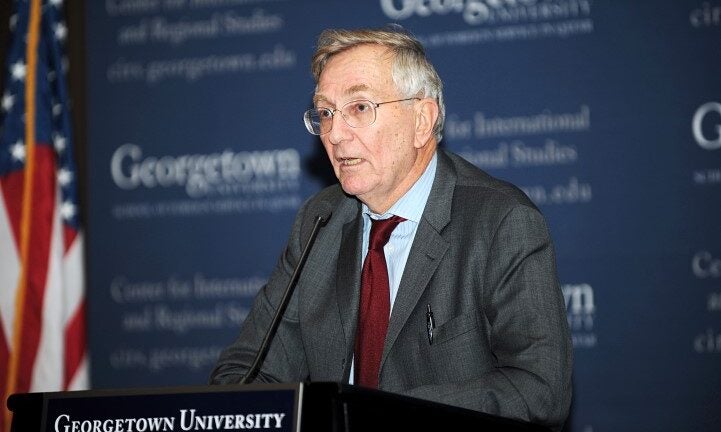American Studies, Dialogue Series, Regional Studies
Seymour Hersh on the Obama and Bush Foreign Policies

Seymour Hersh is a Pulitzer Prize winning investigative journalist and author on national security issues for the New Yorker magazine. On January 17, 2011, he gave a CIRS Distinguished Lecture titled “The Obama/Bush Foreign Policies: Why Can’t America Change?” before an audience of 800 members of the community in Doha.
Hersh has covered everything from Vietnam to Iraq to Iran to the whole of the Middle East, and he regularly analyzes current U.S. foreign policy and issues pertaining to military intelligence, national security and the press. His bestselling books include, The Price of Power: Kissinger in the Nixon White House, The Dark Side of Camelot, and, most recently, Chain of Command: The Road from 9/11 to Abu Ghraib.
Currently, Hersh is at work on a new book in which he argues that the heightened sentiments of fear and reprisal after September 11, 2001, paved the way for a handful of neo-conservatives to take control of the White House with anti-Islam ideologies and policies. According to Hersh, the U.S. invasion of Iraq was presented to the public, both locally and internationally, as a crusade. The Cheney/Bush administration assumed that most people would back their actions because of the supposed nobility of the cause. “There is a tremendous amount of anti-Muslim feeling in the military community,” Hersh argued. “It is a crusade, literally.” What alarmed him most, Hersh explained, was not the drastic policy, but how easy it was to implement. None of the necessary checks and balances was put into place as the public acquiesced and the press became complicit and signed on to the narrative of the “global war on terror” without questioning the underlying motives.
The Obama administration has not made any significant improvements to how the U.S. is handling the wars in Iraq and Afghanistan, Hersh claimed. Since 2003, the war in Iraq has been a losing battle and has resulted in a “war of attrition.” Similarly, the war in Afghanistan is as unsuccessful now for the Americans as it was unwinnable for the Russians in the 1980s. “I truly don’t know any serious officer or special operator or civilian who has been in the war who has any confidence about it. We are not going to prevail in Afghanistan,” he said.
Although Obama’s rhetoric is very different from Bush’s, their policies remain very much aligned, according to Hersh. Unmanned drones continue to bomb targets in Afghanistan and continue to kill both legitimate targets and noncombatants indiscriminately. Obama is fully aware of the damage being done and yet has not tampered with the existing system nor done anything to stop it.
When it comes to American citizens being held in countries like Iran, “we complain bitterly in America about the lack of jurisprudence and the lack of a good legal system and, yet, how many people now are still in Guantanamo, suffering away?” Such double-standards continue to operate and are thoroughly counterproductive. “The truth is,” Hersh said “if they weren’t Al Qaeda when we captured them, and most of them were not, as many of you probably understand, they are now after seven, eight, nine years of being incarcerated without any hearings or any rights.” The insurgency is spreading and is becoming much more violent. Opportunism and morally questionable acts, Hersh argued, have been features of American governance for a long time. He said that “After WWII, we had a secret program of bringing and ‘de-Nazifying’ some of the German scientists who were valuable to our own energy and missile program.”
There was hope that much of the damage done during the Bush era would be fixed when the new administration was sworn in, but, Hersh argued, not much has changed in U.S. foreign policy since Obama took office. Many morally questionable acts like torture, the use of secret prisons, assassinations, and extraordinary renditions have continued unabated.
Hersh expressed his disappointment in Obama’s inability to learn from the mistakes of the Bush administration. He argued that, in America, “We are anti-history […] Why else would we make the same mistake we always make?” Hersh concluded by saying, “I am stunned and appalled that this president did not do what he said he was going to do.”
Earlier in the day, Hersh was invited to the Georgetown’s Qatar campus and spoke informally to faculty and students.
Article by Suzi Mirgani, CIRS Publications Coordinator.